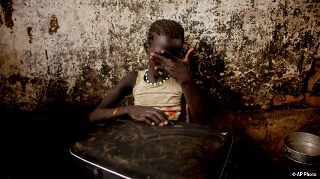Threat of diseases among displaced from Abyei
June 13, 2011 (TURALEI) – Authorities state hosting the majority of the internally displaced persons (IDP) from the conflict-ridden region of Abyei on Monday expressed fears of the spread of contagious diseases.

Most of the IDPs who have sought refuge either with families and friends or relatives have camped in the open in secure, but remote, villages with very limited or no access to safe drinking water, sanitation and other basic living facilities in four neighbouring states of Unity, Warrap, and North and Western Bahr el Ghazal.
The IDPs were forced to flee around 33 villages in the Abyei area.
In interviews with Sudan Tribune on 13 June IDPs in the Turalei catholic compound described their circumstances.
“We are facing too many problems… it is rainy seasons and there are rains. The weather is sometimes cool when it has rained. We are afraid of possible disease outbreaks,” Deng Mawien, a representative of the IDPs, told Sudan Tribune on Monday.
He warned that diarrheal diseases could spread rapidly unless people were helped to resolve sanitation problems. Dominic Deng Kuoc Malek, Twic county commissioner, told Sudan Tribune that there were basic health care facilities in his county, but they would not be able to cope if any major outbreak happened.
GoSS, in cooperation with international relief organisations, have delivered a lot of relief materials, including medicines and non-food items, but the IDPs say they need more.
“This is very important because many of the IDPs fled their homes with only the clothes on their backs. They did not have an opportunity to collect any. The town was taken by surprise. Nobody had expected military taking over,” explained Malek.
The majority of the IDPs interviewed expressed their readiness to return home once the security situation is normalised but some expressed their fear for the future.
“Abyei will never be stable. The government in the north will never honour its promises. It will never live up its commitment. It is the government that is known for reneging on compromises. What they say is not what they do. They say one thing and do another. So there will never be stability in the area if no international forces deployed at the border areas”, said Riing Majak, an ex-official with the Abyei administration.
President Bashir dissolved the Abyei administration when the northern military took over the region last month.
(ST)
